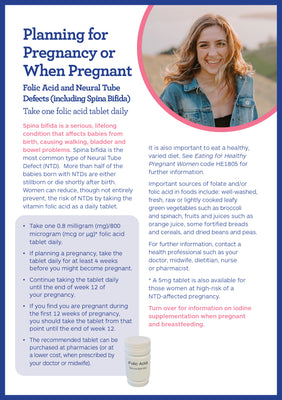Folic Acid and Spina Bifida/Iodine and Iodine Deficiency - HE4147

Advice on reducing the risk of spina bifida (a serious birth defect and the most common type of Neural Tube Defect) by taking folic acid and eating foods containing folate when planning to be pregnant and during pregnancy. Advice on taking iodine supplements when pregnant and breastfeeding.
The full resource:
Planning for Pregnancy or When Pregnant
Folic Acid and Neural Tube Defects (including Spina Bifida)
Take one folic acid tablet daily
Spina bifida is a serious, lifelong condition that affects babies from birth, causing walking, bladder and bowel problems. Spina bifida is the most common type of Neural Tube Defect (NTD). More than half of the babies born with NTDs are either stillborn or die shortly after birth. Women can reduce, though not entirely prevent, the risk of NTDs by taking the vitamin folic acid as a daily tablet.
- Take one 0.8 milligram (mg)/800 microgram (mcg or μg)* folic acid tablet daily.
- If planning a pregnancy, take the tablet daily for at least 4 weeks before you might become pregnant.
- Continue taking the tablet daily until the end of week 12 of your pregnancy.
- If you find you are pregnant during the first 12 weeks of pregnancy, you should take the tablet from that point until the end of week 12.
- The recommended registered tablet can be purchased at pharmacies (or at a lower cost, when prescribed by your doctor or midwife).
It is also important to eat a healthy, varied diet. See Eating for Healthy Pregnant Women code HE1805 for further information.
Important sources of folate and/or folic acid in foods include: well-washed, fresh, raw or lightly cooked leafy green vegetables such as broccoli and spinach, fruits and juices such as orange juice, some fortified breads and cereals, and dried beans and peas.
For further information, contact a health professional such as your doctor, midwife, dietitian, nurse or pharmacist.
When Pregnant and Breastfeeding
Iodine and Iodine Deficiency
Take one iodine-only tablet daily
Iodine is an essential nutrient required in small amounts to support normal growth and development. Iodine is essential for normal brain development. It is important that unborn babies and infants receive enough iodine.
Requirements for iodine increase during pregnancy and breastfeeding. Even with a well-balanced diet, it is difficult to get enough iodine from food alone. Women are advised to choose foods that are important sources of iodine and to supplement their diet throughout pregnancy and breastfeeding with an iodine-only tablet.
Important sources of iodine in foods are: well cooked seafoods†, milk†, eggs†, some cereals, and fortified bread. If salt is used, choose iodised.
- Take one 0.150 milligram (mg)/150 microgram (mcg or μg) iodine-only tablet daily when pregnant and breastfeeding.
- The recommended registered tablet can be purchased at pharmacies (or at a lower cost, when prescribed by your doctor or midwife).
For further information, contact a health professional such as your doctor, midwife, dietitian, nurse or pharmacist.
Vitamin, mineral and health supplements other than folic acid and iodine should only be taken in consultation with your lead maternity carer.
* A 5mg tablet is also available for those women at high-risk of a NTD-affected pregnancy
† See latest advice on food safety on the Ministry of Primary Industries' website at www.foodsmart.govt.nz
Code: HE4147